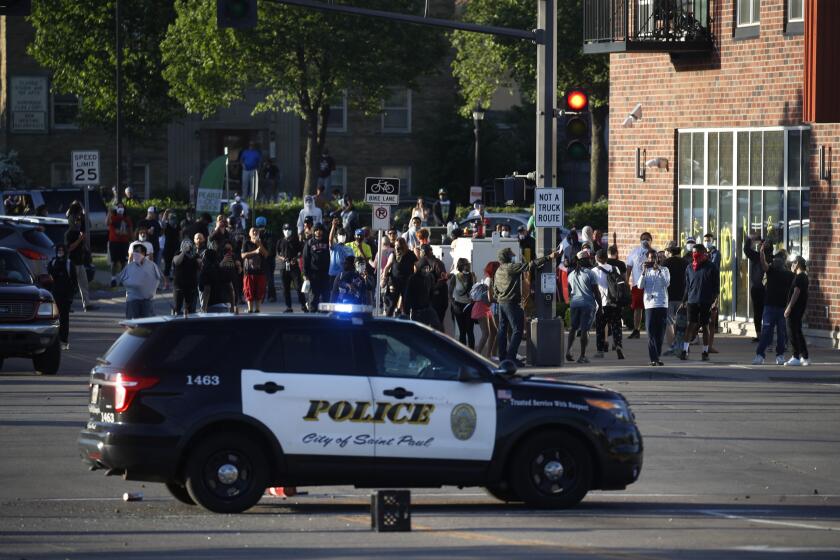On High Court Vote, Centrist Democrats Caught in Middle
The outcome appears all but certain, but the nomination of John G. Roberts Jr. to the Supreme Court is still likely to be a nail-biter for the Senate’s centrist Democrats.
On the one hand, they would like to reward President Bush for consulting with them in advance and picking a nominee who appears legally better qualified and ideologically more temperate than many had expected.
On the other hand, more than Roberts’ fate hangs in the balance. For many Senate Democrats, the debate over Roberts is increasingly a battle over the nature and the direction of the Supreme Court and the president’s efforts to narrow or overturn some of its controversial rulings.
One of those caught in the middle is California’s Dianne Feinstein, the only woman on the Senate Judiciary Committee. In a speech Wednesday to the Los Angeles County Bar Assn., she said that her vote would take into account concerns about the direction of the court.
“The court’s rulings have both shaped and reflected the will and culture of this nation in ways that are everlasting and profound,” she told the audience at the Millennium Biltmore Hotel, listing racial integration, civil rights and personal privacy as examples. “In its role as the final arbiter, setting standards for all other federal courts, and being able to overrule past precedent, the Supreme Court holds a unique position.”
Republicans control a majority of seats in the Senate, so barring some unforeseen development, they have the votes needed to put Roberts on the nation’s highest court before its new term begins in October.
Many Senate Democrats, especially those known as liberals, are expected to vote against Roberts to go on record against his political conservatism.
But for those Democrats who have staked out centrist positions, the decision is more delicate. Some, especially those in Republican-dominated states, are under pressure from constituents who like the reserved, soft-spoken nominee and argue that the president’s reelection gives him the right to name whomever he likes.
Others who, like Feinstein, face reelection next year, worry about a backlash from more liberal constituents if they vote to confirm Roberts and he emerges as a force on the conservative side of the court.
Liberal advocacy groups warn of that possibility. One of the most prominent of them, People for the American Way, announced Wednesday that it would oppose Roberts, calling him part of a “cadre of committed right-wing conservatives” who worked during the Reagan years to limit the scope of privacy rights and civil rights legislation.
“He really is a wolf in sheep’s clothing, or perhaps an Antonin Scalia in sheep’s clothing,” said Ralph G. Neas, president of the group, referring to the Supreme Court’s most vocally conservative justice.
In her speech, Feinstein emphasized the historic nature of the decision to confirm a Supreme Court justice, who enjoys lifetime tenure.
“It is certainly the most important responsibility that the Senate will undertake this year, and it is a decision that could determine the course of our nation for generations to come,” she said.
In particular, she complained that under the guidance of Chief Justice William H. Rehnquist the court had worked to roll back Congress’ authority to make federal laws in such areas as the environment and discrimination.
“If this historic shift continues, the court could significantly restrict the ability of Congress to address nationwide issues with federal legislation the people’s elected representatives decide are necessary,” Feinstein said.
Feinstein and other Democrats have been careful not to say how they will vote on Roberts. On Wednesday, she repeated the only hint she had given:
“It would be very difficult for me to vote to confirm someone to the Supreme Court who I knew would overturn Roe vs. Wade and return our country to the days of the 1950s.”
Other centrists have been more forthcoming. Sen. Ben Nelson (D-Neb.), who is up for reelection in 2006, has told constituents that he doesn’t see anything in Roberts’ record or resume that is problematic.
“Most people in Nebraska believe the president won, he nominated a reasonable person, and we should confirm him,” said Nelson spokesman David DiMartino.
Some political strategists say it is wise for Democrats to keep the focus on the question of the court’s direction, in part because it gives them a reason to oppose Roberts.
“There’s going to be a protracted struggle for the direction of the court over the next few years,” said Ed Kilgore, policy director of the centrist Democratic Leadership Council. “The Bush administration is trying to reshape the court, and [Democrats’] questions and strategy should take that into consideration.”
Others say Roberts will take center stage when the hearings begin, but that the court’s direction will remain the backdrop.
“I don’t think someone is going to vote against John Roberts because they are unhappy with the direction of the Supreme Court,” said Ron Klain, a former Clinton administration official who guided Ruth Bader Ginsburg and Stephen G. Breyer through the confirmation process. “But it is impossible to divorce a decision about John Roberts from the question of what sort of impact he will have on the Supreme Court.”
In the end, knowing their votes can’t block his confirmation, Democrats will probably vote their conscience or their electoral calculation.
“It is important that we don’t just oppose him because Bush nominated him,” Kilgore said. “Democrats need to make it clear that their vote and their analysis is based on bigger issues than the party of the president.”
*
Times staff writer Patricia Ward Beiderman in Los Angeles contributed to this report.
More to Read
Get the L.A. Times Politics newsletter
Deeply reported insights into legislation, politics and policy from Sacramento, Washington and beyond. In your inbox three times per week.
You may occasionally receive promotional content from the Los Angeles Times.










